This blog series will focus on the highlights from different Cash Practitioner Development Programme graduates, allowing practitioners to share what they have learnt and experienced during their Cash School learning deployments.
The Cash Practitioner Development Programme aims to expand the ready pool of cash experts available to deliver humanitarian cash assistance, and to strengthen the community of qualified practitioners with up-to-date skills in all areas of cash assistance. Cash deployments are a key element of participants learning schedules, these deployments aim to enhance skills and confidence in implementing cash based assistance. Some deployments are run in partnership with NORCAP, with practitioners accessing deployment opportunities from a range of humanitarian agencies.
Meet Fredrick Orimba from Our 2021 Cash Practitioner Development Programme!
Frederick Orimba, a then staff member at the Kenya Red Cross Society and now Technical Lead for Cash and Voucher Assistance (CVA) and Social Protection at the German Red Cross, reflects on his journey with CVA and offers advice to others considering applying to join the Cash Practitioner Development Programme (CPDP).
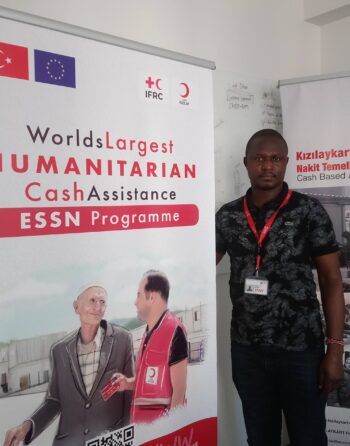
Why did you decide to start working in cash?
I began working with the Kenya Red Cross first as a Regional Health Coordinator and later as a Regional Disaster Management Officer. When the International Federation of the Red Cross (IFRC) visited Kenya in 2012 to roll out training on Cash Transfer Programming (CTP), as it was called then, I was excited to be selected to represent the West Kenya Region. However, my team at the time did not understand the concept of cash and thought it was a financial and accounting training. They instead felt that a staff member from the finance department was best suited to attend the training. The training made us all realise that cash isn’t simply related to finance, but a tool for providing cash to support people in crisis. After completing follow up assignments from the training, the region received funding to implement cash transfers using mobile money in flood responses in West Kenya. The project was very successful and contributed to knowledge evidence on the effectiveness of cash.
Why did you choose to undertake the Cash Practitioner Development Programme (CPDP)?
Having done most of the technical cash courses out there, both online and face-to-face trainings including the Practical Emergency Cash Transfer (PECT) training, I was looking for other opportunities to further develop my skills through higher level training and coaching and to gain cash experience in different contexts beyond Kenya. I heard about the CPDP programme through someone in Kenya and made a commitment to join the next cohort to grow my cash programming skills and network to develop myself further. I thought: “this programme is something I need”. I made an application and luckily, I was selected.
Where did you undertake a deployment?
I did my deployment learning in Turkey from 17th June to 30th August 2021. The Turkish Red Crescent has the largest cash programme for social protection, the Emergency Social Safety Net (ESSN). I learnt a lot from the massive Kizilaykart cash project!
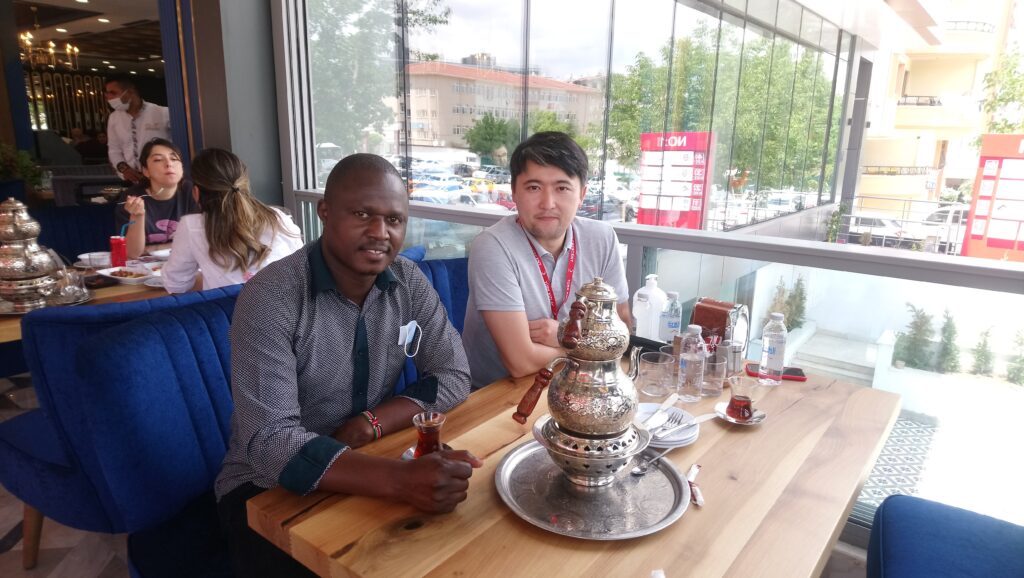
Tell me about a few of your highlights from the CPDP programme.
- My mentor really kept me on my toes. It was not always easy to balance work and the programme so my mentor was a huge help. We had some great moments together and we learnt a lot from each other!
- I loved being deployed to Turkey. I had been looking for deployments for ages. I got to see how people do Cash outside of Kenya.
- The alumni meetings have been great. I was always happy to know I could reach out to someone if I needed to ask questions.
What advice do you have for someone new to the programme?
Any serious CVA expert looking for an opportunity to advance their CVA skills should enroll in this programme. The programme takes learners through practical learning by applying and implementing CVA in real time scenarios giving participants an opportunity to gain experience, insights and technical expertise that is not attainable in a conventional classroom setting or online. It also provides an opportunity to connect with other CVA experts in other parts of the globe for peer-to-peer learning. It is not as easy as just joining. You need to plan your time well because you need to complete everything within one year.
What difference has the CPDP made to you and your career?
Apart from building my skills and capacity in CVA, it has improved my CV. Not many people can say they have gone through a year–long training in cash. It has given me a step up in the field of CVA.
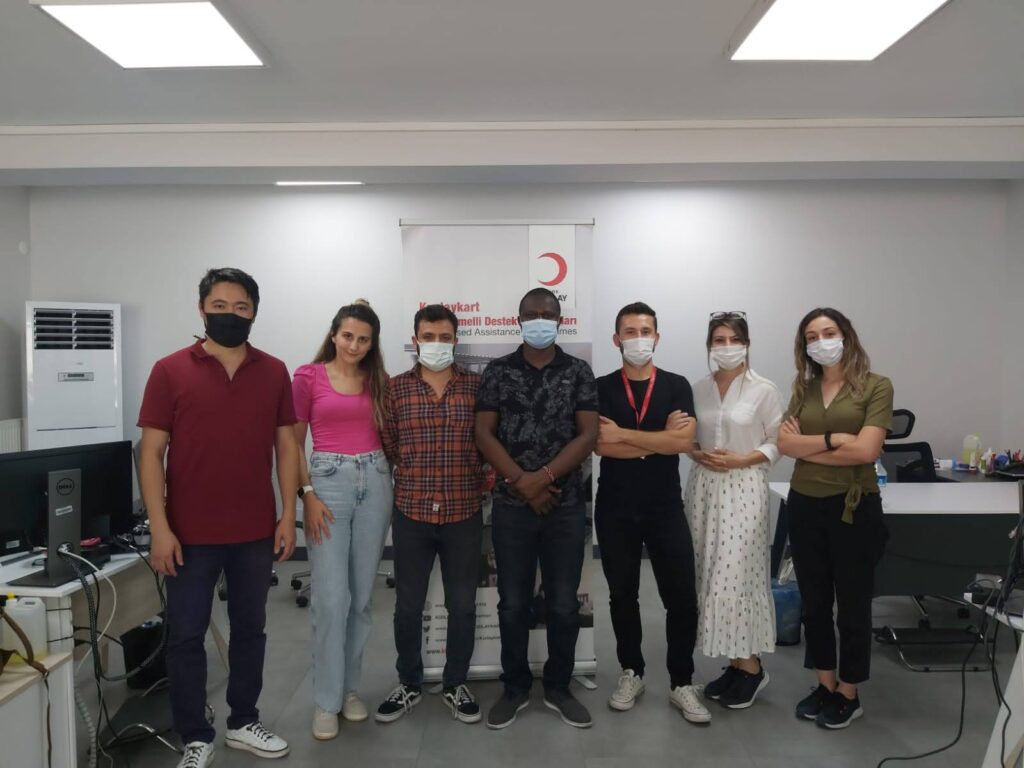
What difference has it made for the National Society (NS)?
- When you build staff capacity, you are building the capacity of the NS as covered in the CVA preparedness pillars of a NS. When I returned from my deployment, I made proposals to my head of department about how we can improve CVA programming in the NS. We hired a staff member to work in Cash Information Management, which really improved our programming in the use of cash and projects.
- The skills I have gained are helping me a lot in my current work and simultaneously my former NS among others have benefitted from it as we are supporting them as a Partner National Societies.
Any final thoughts?
Cash and Voucher Assistance (CVA) usage seems to be reaching a plateau. Some people are still reluctant to use cash and this is a discussion that needs to be pushed for us to continue contributing to our target. By 2025, the IFRC commits to deliver 50% of humanitarian assistance through the use of cash and vouchers. This can only be achieved through sustainable advocacy for and use of cash and vouchers among RCRC Movement partners.
This blog series will focus on the highlights from different Cash Practitioner Development Programme graduates, allowing practitioners to share what they have learnt and experienced during their Cash School learning deployments.
The Cash Practitioner Development Programme aims to expand the ready pool of cash experts available to deliver humanitarian cash assistance, and to strengthen the community of qualified practitioners with up-to-date skills in all areas of cash assistance. Cash deployments are a key element of participants learning schedules, these deployments aim to enhance skills and confidence in implementing cash based assistance. Some deployments are run in partnership with NORCAP, with practitioners accessing deployment opportunities from a range of humanitarian agencies.
Meet Hortense Sombie from Our 2022 Cash Practitioner Development Programme!
Hortense Sombie, from our Cash Practitioner Development Programme (CPDP) in 2022, reflects on her journey with cash, the highs and lows of the programme and offers advice to others considering applying to be a CPDP alumni.
When did you first hear about the use of cash and voucher assistance (CVA)?
In 2005, I heard about a cash programme in Niger. I found the concept of giving people money quite strange. However, after giving the idea some thought, I put myself in their shoes and thought: “would I prefer to get cash and buy what I need or for people to give me things they think I need? I decided it makes more sense to get money for what I need and when I need it”.

What are some of the main highlights from your time on the CPDP programme?
- Going on deployment to Guinea Bissau and Cape Verde.
- Learning lots of new skills from my mentor!
Have you noticed any changes since leaving the programme?
My perspective used to be narrow but with the Cash School it opened my mind to a different way of seeing how we can use cash. The people I worked with made it clear that you need to understand cash before using it.
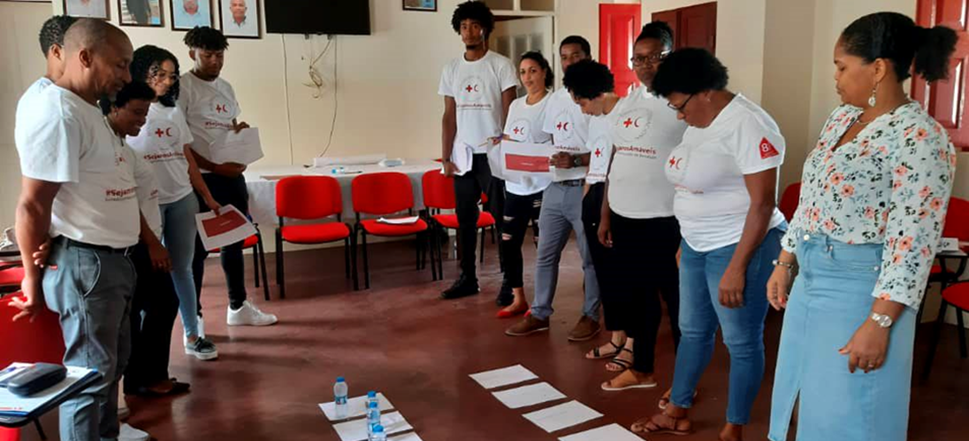
What difference has your time at the CPDP made to your organisation (Burkinabé Red Cross)?
The work in the cash school has helped my National Society (NS) a lot. Before we would address cash without knowing where to get the appropriate tools from. However, when I returned home, I was happy to be able to provide support and advice to people on where to find solutions or help with solving a cash problem. I realised that: “This is the purpose of the cash school: to make us confident in supporting our region and NS!”.
What was the hardest part of taking part in the CPDP programme?
I took part in the programme during Covid-19 and because of this my group did not bond as easily as normal. Whilst this made me sometimes feel lonely, I felt I could always rely on my mentor.
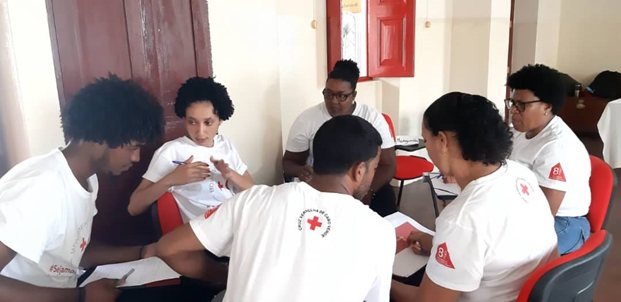
What advice do you have for someone new to the programme?
- Do the learning activities right at the beginning as this will benefit you in the long-run – don’t leave it until later!
- Try to link up with other students from the start.
Would you recommend the programme to other people?
Yes, definitely. It is a very good programme and I have been impressed by the quality of the programme and the subjects involved. I don’t think there are any other programmes like it in the Movement!
For any other questions regarding our next Cash Practitioner Development Programme please contact the Cash School on Cashschool@redcross.org.uk
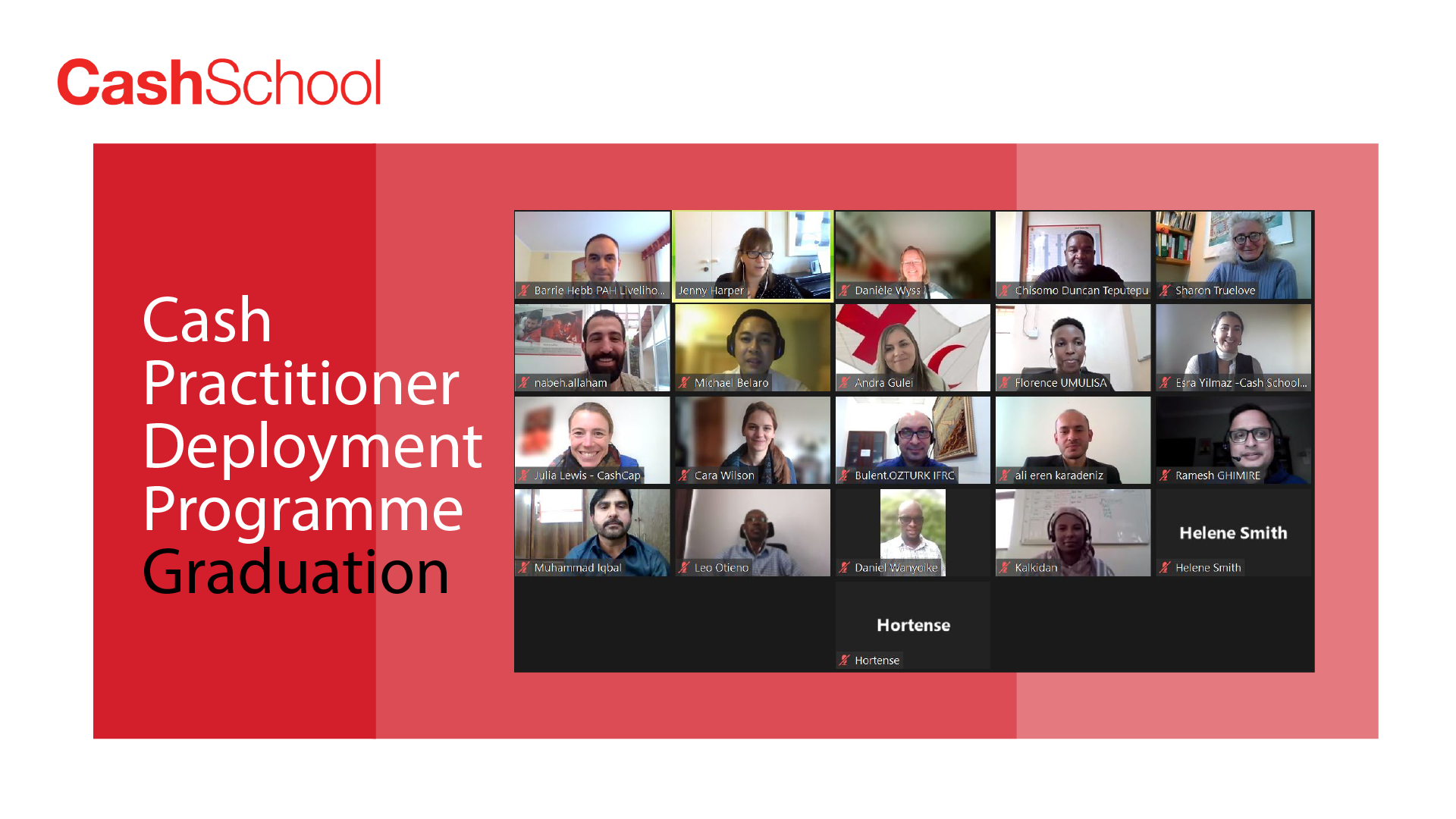
The Cash Hub is delighted to celebrate the new Cash School 2022 Graduates!
This week the cash experts joined a final call to celebrate their achievements and hard work. Exposure to new contexts, new organisations and cash coordination mechanisms through deployments to Turkey, Philippines, Iraq, South Sudan, Madagascar, Nigeria, Pakistan and Sahel have all contributed to expanding practitioners’ confidence and competence. Learning activities included working with expert mentors, real-time research projects, seminars, training, and accreditation.
Congratulations go to Chisomo Duncan from Malawi Red Cross, Daniele Wyss from ICRC, Ramesh Ghimire from Nepal Red Cross, Nabeh Allaham from Syrian Arab Red Crescent, Florence Umulisa from German Red Cross, Muhammad Iqbal from Pakistan Red Crescent and Tom Norman from NORCAP who will join the group of Cash School Alumni.
Normally the program requires an ex-pat to support cash activities. But now I am doing it – all the experience I have is based on the cash school! All the communication, the coordination.
– Cash School Member
About the Cash School
The CPDP aims to expand the ready pool of cash experts available to deliver humanitarian cash assistance, and to strengthen the community of qualified practitioners with up-to-date skills in all areas of cash assistance. Cash deployments are a key element of participants learning schedules, these deployments aim to enhance skills and confidence in implementing cash based assistance. Some deployments are run in partnership with NORCAP, with practitioners accessing deployment opportunities from a range of humanitarian agencies. You can read more about the programme here
Watch the video below to see highlights from the programme
This short survey, created by CALP Network, is designed to collect the views of people whose work touches on humanitarian Cash and Voucher Assistance (CVA), in relation to issues such as scaling CVA, quality, risk and multi-purpose cash.
The survey is available in Arabic, French, English and Spanish and should take no more than 15 minutes to complete. The data gathered will inform the next State of the World’s Cash report which will be published in 2023.
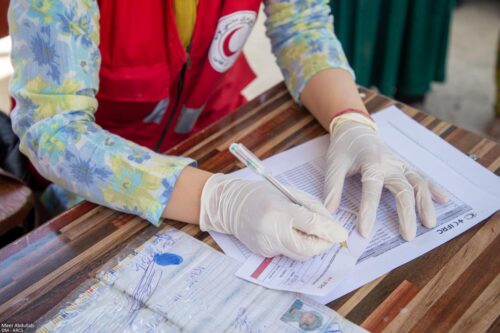
The current crisis in Ukraine has shocked us all and resulted in a huge outpouring of solidarity and support. Rightly as humanitarians, and as custodians of the Fundamental Principle of humanity, we want to deliver assistance that supports people’s dignity and choice at the scale and speed that is needed.
Now more than ever, perhaps it is easier for us to understand what a cash first or default approach is. Markets are functioning across the crisis and all the countries affected (except for some areas of eastern Ukraine) and more importantly people are used to a cash economy. So why have we not been able to deliver cash within hours linked to well-established safety nets systems for those fleeing their homes? Why have we continued to deploy a goods-first approach?
We have chronically under-invested in humanitarian cash delivery; in National Societies, whose leadership needs to continuously commit to the organisational change required, deepen existing partnerships and ways of working with external stakeholders; in the systems and prepositioning of cash to enable strong and capable cash ready first responders; in the surge system, which provides support when national capacities are overwhelmed; and in the people and competencies that are needed.
For too long we have tried to adapt our existing systems for in-kind to cash, because cash ‘is easy’; because we focus on sectoral outputs rather than outcomes and impact; and because ultimately, we are failing to be driven solely by people’s needs and preferences. We need new operational models fit to deliver cash that place people at the centre and we need to shift investment to enable this to become a reality.
The Movement response is starting to deliver emergency cash in the surrounding countries, which requires simultaneously building National Society commitment and competence, data sharing protocols with a range of external stakeholders, self-registration applications, community messaging and feedback mechanisms as well as how to physically deliver cash into people’s hands, of course. We should be proud of this as it is a testament to those cash experts (well done BRC for supplying 14 such experts to date!) who have been advocating to their National Society peers to take up a modality that is new for the majority, at the same time as coordinating externally and internally and designing and implementing the response. The picture in Ukraine is somewhat more complicated.
Learning will start to be captured in real time but let this be a lesson to all of us that we must commit to do better. We need to build a new way of working that enables prepositioning of National Society leadership commitment to integrating Cash & Voucher Assistance (CVA) and sustainable capacities and a fit for purpose surge system that can and will deliver cash within 48 hours to, say, 500,000 families. To do anything less would mean we are not learning the lessons right in front of us.
The original article is published on the IFRC website.
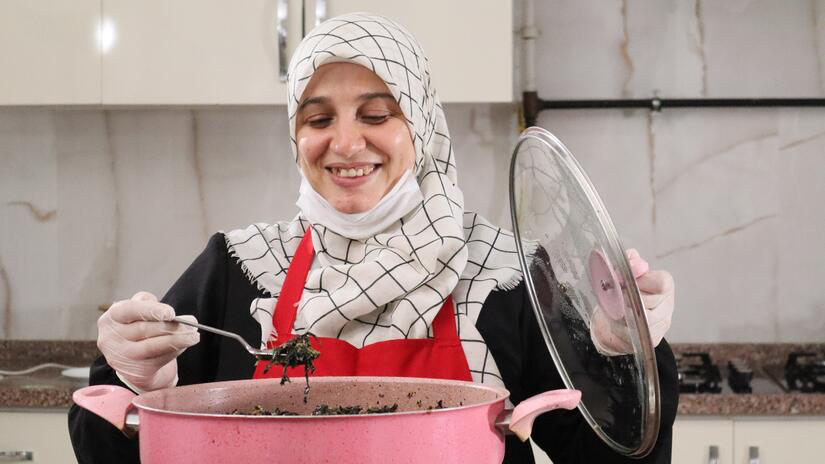
The world is facing record levels of people forced to flee their homes due to violence, insecurity, and the effects of climate change (UNHCR 2021). Many cannot return home and face the new overwhelming reality to resettle and rebuild somewhere from zero. As is the case for many protracted crises, how do we face the challenge of responding to the urgent needs while also the long-term solutions to help improve lives for the years to come?
By Deniz Kacmaz, IFRC Turkey, Livelihood Officer
Turkey is hosting the largest refugee population in the world. More than 3.7 million Syrians have sought refuge as well as 330,000 under international protection and those seeking asylum, including Iraqis, Afghans, Iranians, Somalis, among others. With the conflict in Syria now entering its twelfth year with few signs of change, means that we are not just looking at a humanitarian emergency anymore, but on long-term resilience.
Since the refugee influx began in Turkey, the Turkish Red Crescent (Türk Kızılay) has been taking a leading role in the response. As of April 2020, Turkish Red Crescent through its KIZILAYKART platform and IFRC run the largest humanitarian cash programme in the world, the Emergency Social Safety Net (ESSN), funded by the EU.
This programme has helped more than 1.5 million cover some of their most basic needs, covering their groceries, rent and utilities, medicine and their children’s school supplies.
But humanitarian emergency cash assistance can only go so far. There is also a need to focus on longer-term resilience. This is why we are working on both the urgent needs of refugees, while also supporting longer-term livelihood opportunities for refugees and host communities.
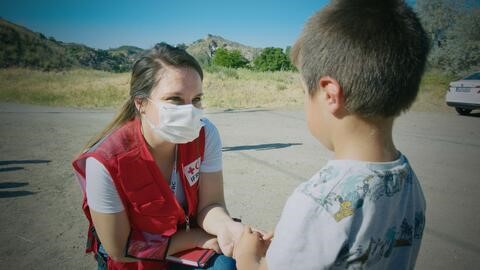
Photo: IFRC
From humanitarian cash to longer-term resilience
We are working on both the urgent needs of refugees, while also supporting longer-term livelihood opportunities for refugees and host communities. This means being part of the labour market to meet their own needs and rebuild their life without depending on social assistance, including the ESSN.
We must focus on long-term solutions where refugees, supported by the ESSN, gain their power to stand on their feet and become self-reliant again.
I have been working at IFRC Turkey Delegation for almost two years helping identify gaps and find opportunities to empower people’s socio-economic capacities. This approach helps ensure they are resilient in combating challenges in the future, including the devastating socio-economic impacts brought on by the COVID-19 pandemic and general obstacles around employment opportunities.
We have seen in many contexts when refugees are able to build their resilience and self-sufficiency, they can contribute even more meaningfully to the local economy. When they benefit, we all benefit, including host communities.
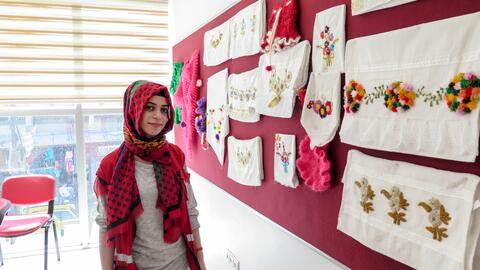
What are we doing to bring this long-term solution to the lives of refugees?
As of April 2021, we have launched referrals that link people receiving cash assistance through ESSN with a plethora of livelihood trainings and opportunities in Turkish Red Crescent community centres.
The 19 community centres across Turkey offer support to both refugee and host communities, including work permit support, vocational courses such as sewing; mask producing; various agricultural trainings; and Turkish language courses and skills trainings. These services are critical to breaking barriers in the local markets. The community centres connect skilled individuals to relevant job opportunities by coordinating with public institutions and other livelihood sector representatives.
The ESSN cash assistance provides support to refugees in the short term while giving them opportunities to learn new skills, which can lead to income generation in the long term.
How do we conduct referrals from the ESSN to livelihoods?
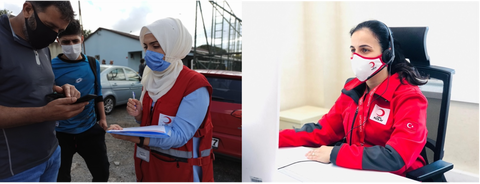
There are many sources where families are identified for referrals, some of the most common are:
- Turkish Red Crescent (Türk Kızılay) Service Centre
- 168 Kızılay Call Centre
- Direct e-mail address to the TRC referral and outreach team
- Identified potential individuals among ESSN protection cases
- Field teams including monitoring and evaluation and referral and outreach teams who are regularly engaging with those benefitting from ESSN
In the first months of combining cash assistance with longer-term programmes, we have supported more than 1,000 refugees.
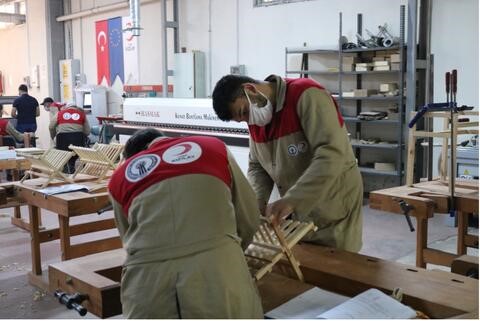
Some have been referred to employment supports including consultancy for employment and work permit support, while others are attending language courses, vocational trainings, and skills development courses through public institutions, NGOs, UN agencies and TRC’s community centres.
Though we have developed a robust livelihood referral system, collectively, we need to make stronger investments in social economic empowerment in the future.
While we continue to work on improving our programming and referral mechanisms, as IFRC, we are also reaching out to agencies, civil society, donors, and authorities to look at how we can:
- increase investment in socio-economic empowerment in Turkey,
- mitigate barriers to employment for refugees, and
- create greater synergies between humanitarian and development interventions.
It is this collective effort that will deliver the longer-term gains necessary for both refugee and local communities in Turkey to thrive.
—
The ESSN is the largest humanitarian cash assistance program in the world, and it is funded by the European Union. The ESSN has been implemented nationwide in Turkey in coordination and collaboration with the Turkish Red Crescent and International Federation of Red Cross and Crescent Societies (IFRC). We reach more than 1.5 million refugees in Turkey through the ESSN, and we give cash assistance to the most vulnerable populations to make sure they meet their basic needs and live a dignified life.
The Turkish Red Crescent with its 19 community centres throughout Turkey supports millions of refugees as well as host communities. The Centres provide several courses, vocational trainings, social cohesion activities, health, psychosocial support, and protection services, among others.
This blog series will focus on the highlights from different Cash Practitioner Development Programme deployments in 2021, allowing practitioners to share what they have learnt and experienced during their Cash School learning deployments.
The Cash Practitioner Development Programme aims to expand the ready pool of cash experts available to deliver humanitarian cash assistance, and to strengthen the community of qualified practitioners with up-to-date skills in all areas of cash assistance. Cash deployments are a key element of participants learning schedules, these deployments aim to enhance skills and confidence in implementing cash based assistance. Some deployments are run in partnership with NORCAP, with practitioners accessing deployment opportunities from a range of humanitarian agencies.
Name : Danièle Wyss
Job title : Cash & Market Specialist – ICRC
Where were you deployed : Deployed to work with the Turkish Red Crescent (Ankara & Gaziantep)
What type of work did you complete as part of the deployment?
During the deployment I worked with the TRC’s Coordination and Project Coordination teams, the deployment aimed to provide experience in strategic CVA coordination, including the ESSN taskforces and coordination mechanisms under the Regional Refugee and Resilience Plan (3RP). I participated in their Basic Needs and CBI Working Group meetings.
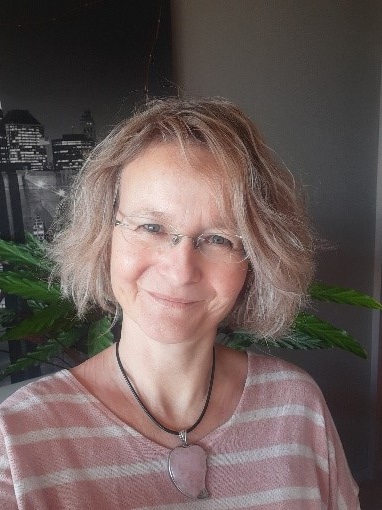
I wrote a comprehensive paper on what is KizilayKart, how it works and what makes it such a success. It contains background information on the crisis, the Turkish Red Crescent, the registration process, the current and completed programes, the seven KizilayKart workflows/units, the internal and external coordination mechanisms, links to relevant websites, platforms etc and an ‘interview’ section resulting from my field trip to Gaziantep and Ankara where I was able to ask many questions about the process as a whole.
What have you learned most about?
My key learnings were:
- Good coordination between humanitarian actors and all stakeholder is possible
- Unless there is political will, no matter how much inter-agency coordination and how good it is, the response will not be a success
- AAP/CEA is essential for beneficiaries and non-beneficiaries alike but also for host-communities, staff and volunteers
- For such a response to be successful and to avoid unnecessary tension, the host community must be included in the process and the assistance
What was a ‘stand out’ moment for you on your deployment`?
For me it was definitely the field trip to Gaziantep where I was able to witness first hand all the work done by the TRC. We had the opportunity to speak with various departments from the Gaziantep ESSN office, visit a Community Centre and a Service Centre. We were able to interview numerous people, such as:
-> M&E field team
-> M&E Operators team
-> Call Centre team
-> Outreach team
-> In-camp Management team
-> Deputy coordinator
-> Community Centre team
-> Service Centre manager
It is quite impressive to see everyone’s dedication but also the variety of different nationalities working on the projects. A substential number of colleagues have been involved from the start of the crisis and worked in various departments/workstreams of the TRC and the KizilayKart project. Quite a few have themselves gone through the whole process, which means that they have a deep understanding and knowledge of all the programmes and know how to best address people’s queries and/or worries.
Author: Maja Tønning, Regional CVA Coordinator, IFRC Africa
The IFRC in the Africa Region has coordinated the launch of an online Cash Community of Practice (CoP) for all African National Societies (ANS), now live on the Cash Hub platform. The online CoP seeks to connect all ANS and their partners and to strengthen peer learning and sharing. This online cash CoP will also host the Africa Cash Roadmap 2022-25 which is structured around National Society priorities and ongoing efforts and experiences in Cash and Voucher Assistance (CVA).

The Cash Roadmap and the online Cash CoP were based on consultations with 72% of African National Societies as well as the engagement of regional and global IFRC staff and partners, including ICRC, supporting CVA in Africa. In total, around 500 answers to challenges and opportunities were collected.
Great initiative, and really impressive to hear how many African NS have been involved in defining the needs.
PNS representative during the review session
The Africa Cash Roadmap consists of several related and integrated parts:
- A PDF which is an overall introduction to the Cash Roadmap and a narrative to use with partners, for fundraising and for external communication.
- The online Cash Community of Practice (CoP) for African National Societies, which can be accessed clicking on this link.
- The online Cash Roadmap outlining National Society priorities for CVA on an annual basis. Click here to access a web page dedicated to the Africa Cash Roadmap.
- An online Kobo survey, which feeds into the online Cash roadmap and specific action plans for National Societies in Africa.

Jordane Hesse who worked as a consultant on developing the Africa Cash Roadmap stated:
When the Movement established a CVA objective at 50% by 2025*, with 49 National Societies and many Partner National Societies having different starting points and challenges, an interactive roadmap became a must to support each ANS in scaling CVA, targeting qualitative and efficient interventions. The tool developed is a response to what the field voiced. It aims to support, facilitate, inspire each one of them, and will evolve over the next 4 years.
*the assistance delivered directly to households, i.e. between in-kind and CVA, excluding services
The online Cash CoP will be updated on a continuous basis and French translations will be available in early 2022. If any National Society or Partner has specific updates to share on CVA for the Africa Region, feel free to reach out to Maja.Tonning@ifrc.org and we can post these on the online Cash CoP as well.
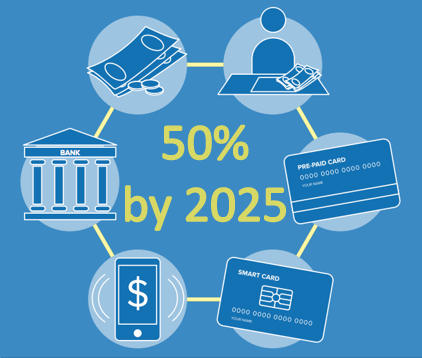
Click here to read the original article published on the ICRC website.
The Analysis & Evidence Week 2021 – Data, data, data… but then what? provides a unique forum to engage in the common topics facing evidence-based decision-making in humanitarian action.
The event aims at bringing together humanitarian actors, the private sector, academia and beyond to discuss opportunities and challenges of data policies, methodologies and usage, while ensuring the analytical work is actionable and practices remain people-centred.
More than 2,000 people showed interest and participated to the event. Among them there were representatives of the Red Cross and Red Crescent Movement, UN agencies, NGOs, private sector, donor community and academia. On average 65 people attended each session with a peak of nearly 250 attendees at the Opening Ceremony.
If you were not able to attend some sessions, or you would like to listen in once more to the great initiatives and discussions broadcasted last week, you can find below the recordings to the 60+ sessions held during the event. The videos will be available online for 30 days, and can be downloaded for future reference.
Should you wish to have further information on the event and/or follow up on possible collaboration opportunities, do not hesitate to reach out to me and the rest of the A&E Team via email at EcoSecAnalysis@icrc.org
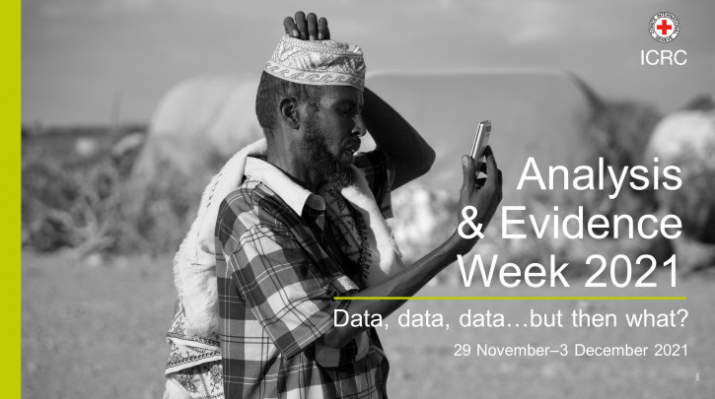
SESSION RECORDINGS
29 November 2021
- Opening Ceremony – ICRC
- Launch of the Needs Assessment and Targeting Guidelines – ICRC A&E
- Documenting and measuring the impact of attacks on healthcare: lessons learnt from Afghanistan – U. Geneva
- Seed Tracking Initiative in the Central African Republic – ICRC Central African Republic
- COVID-19 GO Dashboard a Federation-wide Data Collection Effort – IFRC
- Protection of Civilians: Criteria and Prioritization – ICRC Protection (internal session)
- Data Disaggregation: Just a reporting requirement, more data than we can handle, or an essential tool to leave no one behind? – ICRC AAP (internal session)
- Using data to inform decision-making for sustainable humanitarian logistics – U. Coventry / ICRC Logistics
- Monitoring operational resilience of essential service delivery in protracted urban armed conflicts – ICRC WatHab (No recording available, apologies for the inconvenience)
- JIAF: A Concept, Framework and Process for a Person-Centered Intersectoral Analysis – UN OCHA / ECHO
- Everything in space and time: Spatial analysis for humanitarian decision-support – HHI / Esri
- Analyzing Health and Conflict Data to Understand the Impact of IHL Violations – Berkeley U. / John Hopkins U. / LSHTM
01 December 2021
- Blurred Boundaries: Aspects & Challenges to Accountability in Operational Research – ICRC CORE
- Strengths in number, rethinking analytical capacities and network in the humanitarian sector – The Operation Partnership
- Informing Geographic Targeting with Secondary Data – ICRC Near and Middle East
- Overview of the Information Management Resource Portal – CartONG
- Data and Response to the Dangers Posed by Mines and Explosive Remnants of War – ICRC Weapon Contamination
- Protection Analytical Framework: A Common and Structured approach – DRC / IRC
- Emergency Assessment for a Joint Response to Mt. Nyiragongo Eruption in DRC – IFRC / Swedish RC
- Analysis & Evidence Opportunities and Career Paths in the ICRC – ICRC Talent Management
- Better Data, Better Decisions? – Will improved data sharing lead to improved decision-making in humanitarian response? – UN OCHA / WFP
- Strengths in Numbers: Rethinking Analytical Capacities and Networks in the Sector – The Operations Partnership
- COVID-19 GO Dashboard: a Federation-wide Data Collection Effort – IFRC
02 December 2021
- EpiWatch – Preventing the Next Pandemic – U. New South Wales
- Introducing the MEI Multiform – ICRC EcoSec (internal session)
- Remote Data Collection in Action (Bangladesh, Somalia) – ICRC Somalia and Myanmar
- Access to Basic Amenities at Household Level for Advocacy and Decision Making – MSF (Session cancelled due to no-show of speakers)
- Applying the INFORM Quantitative Analysis for Humanitarian Aid Decision-Making – ECHO
- Learning from Disruption: from Covid-19 Monitoring to Situation Monitoring – ICRC A&E
- Addressing Climate Change through Participatory Mapping in Rural Tajikistan – CartONG
- Diving into DEEP: Promoting a Collaborative Approach to Humanitarian Analysis – DRC
- Water & Habitat – Enhancing the Planning, Monitoring and Evaluation Cycle – ICRC WatHab (internal session)
- Bridging the Gap between Global and Regional: A connected Impactful Analysis – ACAPS
- Multidisciplinary Assessments: Lessons Learnt from the Middle East – JIPS / ICRC Near and Middle East
- Evidence-Based Practice to Support Humanitarian and Development Aid Activities – Belgian RC
- Opportunities and challenges of Data Policies, Methods and usage in the private sector – U. Muni (Session cancelled due to no-show of speakers)
- Using web surveys to Inform Decision Making in Latin America – WFP
- Blurred Boundaries: Aspects and Challenges to Accountability in Operational Research – ICRC CORE
- Crowdsourcing Data for Real-time Insights – Premise
- Community-Based Surveillance and Nyss in Somaliland – Norwegian RC
03 December 2021
- Nutrition Outcome Analysis – Independent Speaker
- Remote Sensing and Spatial Analysis to Complement Field Work – ICRC GIS
- How Much Data is Enough Data? Drivers of Over-Collection and Red Lines – GPPi
- Accessibility to Toilets and Inclusion: Lessons from Indonesia – ICRC Indonesia
- Data Protection in Action – FAQs for Assistance Programmes – ICRC Data Protection Office
- The UK Hardship Fund – Financial Support for the Most Vulnerable during COVID-19 – British RC
- Needs Assessments and Data Management in Fragile Contexts – PwC
- Remote Management of Affected People – ICRC A&E
- Getting to Impact: Right-Sizing Evidence Collection in Humanitarian Crisis – Salesforce
- The Framework for the Ethical Assessment of Humanitarian Drones – U. Geneva / U. Zurich
- Accountability to Whom? – ICRC Data Protection Office
- Emergency Assessment for a Joint Response to Mt. Nyiragongo Eruption in DRC – IFRC
- The effect of UN Peacekeeping Stabilization Projects on Humanitarian Access – European Institute U.
- How Much Data is Enough Data? Drivers of Over-Collection and Red Lines – GPPi
- Evaluating a Digital Innovation: an Overview of CommCare’s Evidence Base – Dimagi
- Closing Ceremony – ICRC
This blog series will focus on the highlights from different Cash Practitioner Development Programme deployments in 2021, allowing practitioners to share what they have learnt and experienced during their Cash School learning deployments.
The Cash Practitioner Development Programme aims to expand the ready pool of cash experts available to deliver humanitarian cash assistance, and to strengthen the community of qualified practitioners with up-to-date skills in all areas of cash assistance. Cash deployments are a key element of participants learning schedules, these deployments aim to enhance skills and confidence in implementing cash based assistance. Some deployments are run in partnership with NORCAP, with practitioners accessing deployment opportunities from a range of humanitarian agencies.
Name: Shubhadra Devkota
Job Title: Senior Programme and Livelihood Officer, DRC Country Office Nepal
Where were you deployed?
Remotely deployed to the Africa Region to work with Ghana Red Cross Society (GRCS), Nigeria Red Cross Society (NRCS), and Rwanda Red Cross Society (RRCS).

What type of CVA work did you complete as part of the deployment?
I supported the development of the Cash and Voucher Assistance (CVA) Generic Risk Register and user guidelines which shall be used by National Societies (NSs) in the Africa region. While developing this template I ensured coordination with the CVA risk advisor and the protection gender and inclusion advisor of the Africa region, as well as with the information management and data protection advisor from Geneva to capture the context of the region and include risks related to all sectors.
The active involvement and contribution from the CVA teams of three different NSs (GRCS, RRCS and NRCS ) was outstanding. Alongside consultations with sectoral experts and working sessions with CVA teams, a desk review and analysis of available reference materials was conducted from different sources to develop the CVA risk register. I also conducted a series of briefing and working sessions on CVA risk analysis and on the CVA risk register, as well as a short briefing session with the Zambia Red Cross team.
What was the area you learnt most about?
- Development of CVA risk register & user guideline
- CVA risk analysis skills for NSs
- How to use information from the CVA risk register to inform response analysis and CVA programme design
- Virtual working sessions, briefings, and trainings working collaboratively with NSs
- Africa Region Cash Coordination structure
What was a ‘stand out’ moment for you on your deployment?
Preparing a ‘ready to use’ generic CVA risk register and user guidelines acceptable to the region, in consultation with sectoral experts. I also enjoyed the active engagement of different NSs of the region which I consider a “stand out” moment for me during this deployment. Coordination with multiple experts, multiple NSs and managing time in their busy schedules was not an easy task. However, with the teams’ support and input, the CVA risk register and user guidelines were ready within six weeks of my deployment period.
I was also able to share the tools during an online learning session on “Risk management in CVA and the CVA-risk matrix” for NSs, partner NSs and IFRC representatives of the region. The suggestions and reflections from the wide range of participants was another “stand out” moment for me, which indicated that tools shall be used in other contexts and not only in the Africa region.
